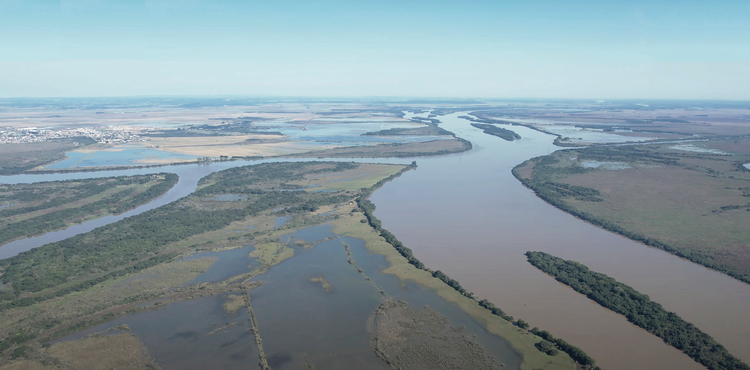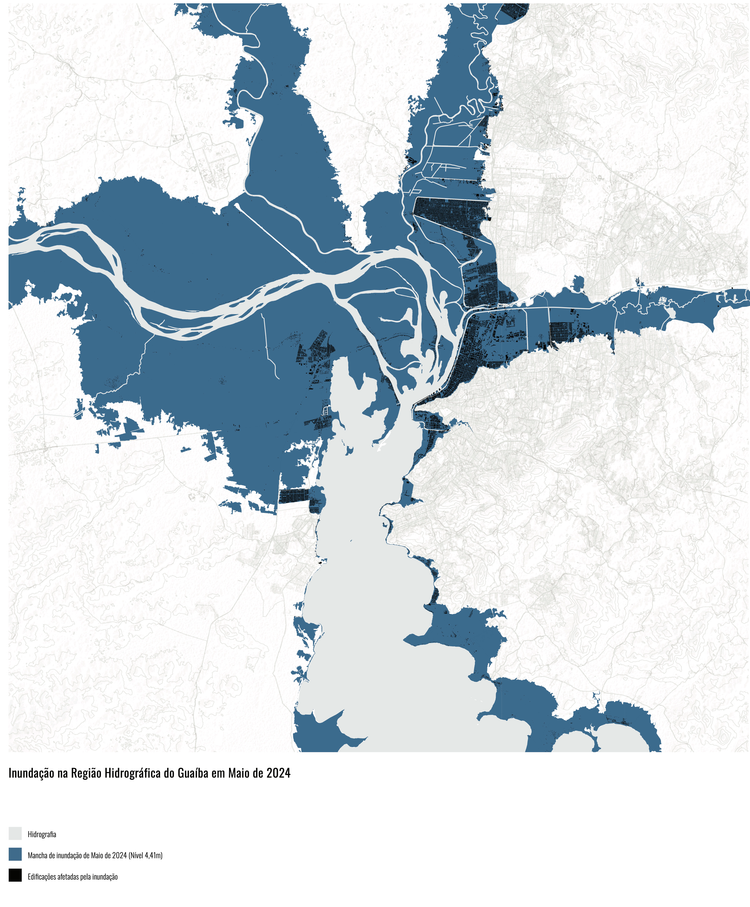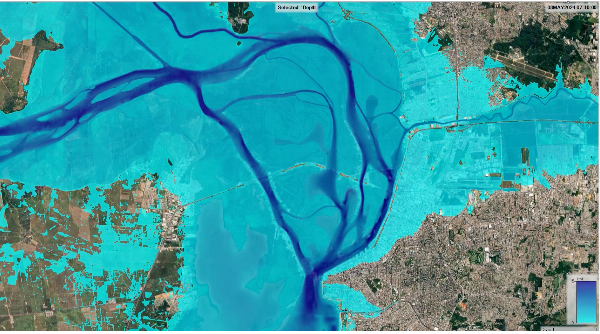UNDP Archipelago Project
Resilience and Reparation under Extremes in the Delta do Jacuí, Brazil
2025-2026
The Archipelago Project is an international, transdisciplinary initiative developed by TU Delft in collaboration with the United Nations Development Programme (UNDP), the City of Porto Alegre, and Brazilian partners. It focuses on the Delta do Jacuí islands in southern Brazil — a fragile and contested territory where extreme floods, ecological vulnerability, and deep-rooted social inequalities converge.
Context
Located at the confluence of the Jacuí, Taquari, Caí, Sinos, and Gravataí rivers, the Delta do Jacuí is one of South America’s most important wetland systems. It provides vital ecological services, regulates water quality, and sustains biodiversity. At the same time, it is home to vulnerable communities whose lives are increasingly threatened by recurrent floods and the intensification of climate extremes. The floods of 2023 and 2024 exposed both the urgency and complexity of planning for resilience in this region.
Introduction
The Delta do Jacuí is located in the metropolitan region of Porto Alegre, formed by the confluence of the Jacuí, Taquari, Caí, Sinos, and Gravataí rivers, encompassing the territories of Porto Alegre, Canoas, Nova Santa Rita, Triunfo, Charqueadas, and Eldorado do Sul. According to the State Secretariat for the Environment and Infrastructure (SEMA), it is characterized by a vast expanse of wetlands that play a fundamental role in maintaining hydrological dynamics, providing ecosystem services, and ensuring water quality, among other functions. The territory is divided into two state-level Conservation Units, with varying degrees of protection: the Jacuí Delta State Park (PEDJ) and the Jacuí Delta State Environmental Protection Area (APAEDJ).
The floods of 2023 and 2024 in Rio Grande do Sul highlight the urgent need to strengthen resilience to extreme events. Reports by the IPCC (Intergovernmental Panel on Climate Change) and the Brazilian National Water and Sanitation Agency point to the severity and unpredictability of climate impacts in the region, underscoring the necessity of new strategies for ecological regeneration and adaptation. Reconstruction must be efficient, rethinking flood protection while integrating systemic and adaptive regional planning, inspired by sustainable transition models and concepts such as design with nature (McHarg, 1969), water-sensitive urban landscape infrastructure (Bacchin, 2015), and room for rivers(Sijmons, Feddes, and Luiten, 2017). Integrated water resource management, combined with sustainable urban development, should bring together traditional infrastructure and nature-based design interventions—engaging environmental, cultural, and socioeconomic dynamics of the landscape—to promote participatory and cross-sectoral planning.
In Porto Alegre’s archipelago of islands, climate adaptation necessarily involves addressing multiple challenges associated with socio-environmental inequality. Historically vulnerable populations, socially and economically, are more exposed to climate disaster risks. While major cities are structured with well-equipped and protected urban centers, their peripheries often lack adequate infrastructure and, consequently, face higher risk. Thus, the environmental challenge is also a social one — and a collective responsibility.
It is therefore essential to plan inclusively, ensuring that the needs of these populations are prioritized and met equitably. This guarantees broad access to services that mitigate climate risks and strengthens adaptive capacity in the face of future extreme events.
The historically distant relationship between Porto Alegre and its waters—especially its islands—must also be reconsidered, as it directly affects the system’s balance and the way inhabitants connect to the territory. The central question becomes: how can the islands of the Archipelago be planned as habitable and resilient spaces in the face of extreme hydrological risks, particularly under intensifying climate crisis conditions? This transition requires the development of a plan that goes beyond environmental protection, incorporating strategies of ecological regeneration and social adaptation. It implies adopting an integrated management model, based on systemic vision, participatory action, and long-term collaborative practices.
This project is the result of a bilateral collaboration between professionals and scientists from Brazil and the Netherlands. It aims to create a transdisciplinary approach to the urban and environmental planning of Porto Alegre’s islands. The proposal places environmental, landscape, and urban design in direct dialogue with plural perspectives of everyday life. It is, therefore, an approach that moves beyond an exclusively technical gaze, recognizing the centrality of diverse local knowledge in the development of contextualized proposals. This recognition goes beyond consultative forms of public participation, instead building collaborative working methodologies between experts and the local population. It is, in essence, the co-creation of a plan — along with its scientific approach and methodology — aimed at fostering just and sustainable socio-environmental relations.
Approach
The project positions the Archipelago as:
- A temporal landscape — always in transition, where floods, sedimentation, and cycles of growth and repair demand design approaches based on time, care, and adaptation.
- A socioecological system — where rivers, ecosystems, and human practices are intertwined, requiring strategies that see infrastructures not only as technical but also as cultural and living.
- A territory of justice — where climate adaptation cannot be separated from addressing historical inequalities. Planning must redistribute protections and opportunities, ensuring recognition, participation, and fairness for vulnerable communities.
Methodology
This transdisciplinary approach brings together universities, design offices, public institutions, and local communities from Brazil and the Netherlands. By framing the Delta as a common good and the Archipelago as a dynamic territory, the project adopts situatedness in design — engaging with the temporal, ecological, and social conditions of place. Linking adaptation to both ecological regeneration and historical reparation, it demonstrates how design, science, and local knowledge can co-create inclusive futures, where resilience is grounded in justice, care, and lived experience.
Partners and Credits
Delft University of Technology, Faculty of Architecture and the Built Environment
Taneha Kuzniecow Bacchin (scientific lead)
Raquel Hädrich Silva, Julia Daher, Luiz Felipe do Nascimento, Roberto Rocco, Nikos Katsikis, Zac Taylor, Luisa Maria Calabrese
IHS Institute for Housing and Urban Development Studies
Carolina Lunetta
Versa Urbanismo
Mariana Mincarone, Amanda Kovalczuk, Camila Kuhn, Carolina Falcão, Pamela Milesi, Julia Boff, Sophie Rivoire, Poliana Antunes
Rhama Analysis
Carlos E. M. Tucci, André LL da Silveira, Benicio Monte, Eduardo N. Manara, Daphne Calazans
H+N+S Landscape Architects
Dirk Sijmons, Jaap van der Salm, Sandra Rodriguez
FABRICations
Eric Frijters, Rens Wijnakker, Fabio A. Alzate Martinez
Delta Jacui, Brazil


